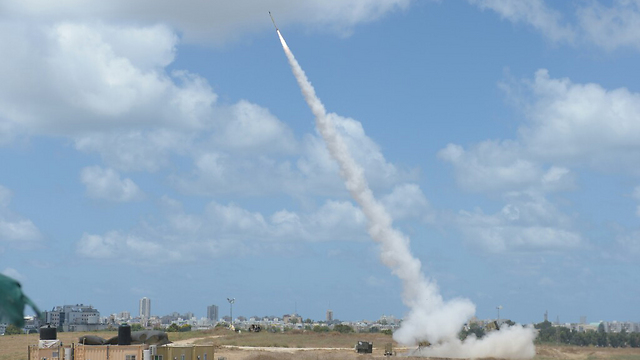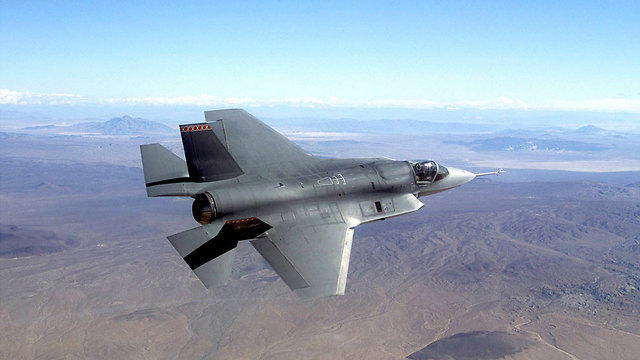
Washington is waiting for Israel's demands on Iran
Israeli officials are divided over when to ask for American war machines, and which, in return for acquiescence on the Iranian nuclear deal; meanwhile, US officials are asking, 'Where has Israel's schnorrer culture gone?'
The Foreign Ministry, intelligence community and even AIPAC believe that the deal with Iran over its nuclear program is done, and even the US Congress will not be able to stop it from being signed. As such, they now believe it might be time to shift gears.
Officials in Jerusalem have now realized that instead of continuing to fight a lost cause, Israel has another route that could help secure its interests – namely, asking the US for compensation in the form of expensive weapons or other benefits.
The current debate among these officials is over which way Prime Minister Benjamin Netanyahu should go – whether he should accept the deal through gritted teeth and demand a high price for acquiescence in the form of expensive weaponry, or continue to fight it.
A senior State Department official told Ynet's sister-publication Yedioth Ahronoth: "The White House is willing to pay a hefty price to get some quiet from the Israelis at this point. We are surprised the demand has not been made. Where has Israel's famous schnorrer culture gone?"
Firstly, regarding Israel's attempt to thwart the agreement through Congress and the Senate. The Senate voted recently to pass a draft resolution allowing it to place restrictions on the agreement the administration is due to sign in July. However, this is seen as a decision in principle only, and even President Obama announced he has no opposition.
The bill's opponents were unsuccessful in passing an amendment requiring any agreement to be submitted to the Senate as a treaty. Under the constitution, that would require approval of two-thirds of the Senate.
One of the most pivotal and vocal senators working against the Iran nuclear deal was former chairman of the Senate Foreign Relations Committee, New Jersey Democrat Robert Menendez.
The bill's opponents, including those in the Israeli Prime Minister's Office, had hoped that Menendez would be able to stop the bill from passing, mainly because he was a key Democrat willing to speak out against the White House, but a recent corruption investigation opened against Menendez by the US Justice Department caused those hopes to diminish.
- Orly Azoulay / The Iranians are praying for an agreement
- Efraim Halevy / Obama was right, Iran capitulated
- Obama on Iran: I have a personal interest in locking this down
In light of the investigation, Menendez announced on April 1 that he was suspending himself from the Foreign Relations Committee. "With his departure from the scene, at least at this time, the most important engine working against the signing of the deal has disappeared," said a Senate staffer.
A journalist who regularly covers the White House and asked not to be named said that over the past four weeks, there has been a change in tone with regards to Netanyahu.
"It is not because all of a sudden they love the prime minister of Israel there, or because they want to have another go at bringing peace to the Middle East," he said. "But rather because, in their eyes, everything must be done to get the deal with Iran approved, if and when the remaining details that were left out of the outline signed in Switzerland are agreed upon."
The White House is ready to seriously consider significant compensation for Israel if it does not too strenuously oppose the deal at present.

The State Department source says that the subject of what Israel would demand has also been raised – and would receive - in assessments between the State Department and Pentagon, "to suit the new security situation in the region." One reasonable option concerns an increase in the number of F-35s that Israel will receive.
In February, Israeli Defense Ministry officials signed a deal for the sale of 14 more jets, in addition to the 19 already purchased in 2010, all at a average price of $110 million per plane.
Israel planned to buy another 17 planes, but in the wake of Israeli difficulties in raising the money, and opposition from cabinet ministers, it was classed as an "optional" purchase, and was never carried out. The State Department source says that the US will be ready to consider a "substantial subsidy" for some of these additional planes.
A second option is "generous" financial support for the purchase of more C-130J (Super Hercules) cargo air force jets. A third option – another Iron Dome battery courtesy of the American tax payer.
At the Israeli Foreign Ministry, Defense Ministry and Prime Minister's Office in Jerusalem, officials acknowledge the American readiness to pay a heavy price for the Iran deal, but are in no rush to exact that price. A fierce argument is raging among officials regarding this issue.
A member of the Foreign Ministry puts it thusly: "If we come with demands at this stage, it will mean that we have effectively ended our opposition to the agreement, and it would only be a question of the price. If Israel is operating on the assumption that this is such a terrible deal for the security of the state, it cannot look like it ultimately capitulated."
On the other hand, sources in the Military Intelligence (AMAN) Research Division who deal with international affairs claim that the agreement is already a done deal and now is the time to get as much as possible for the security of the state. "If we present our demands only after the deal has been signed, and after we tried to scupper it in every way possible, the amount we can ask for will be far smaller, if anything".
Israel is indeed a master of the "schnorrer culture", as the State Department source put it. Take, for example, a discussion at the Defense Ministry on October 5, 1973, the eve of the Yom Kippur War. Then defense minister Moshe Dayan refused to get excited over warnings of a looming conflict, even raising the possibility of warning the Egyptians and Syrians that Israel knew about the impending war and would let them attack in order to annihilate them.
In return for Israel showing restraint, Dayan instructed Defense Ministry officials to prepare a list of equipment and weapons that Israel would demand from the United States immediately after the war ended.
Either way, Netanyahu has to rule in the coming weeks on this important dispute.
(The original version of this article was published in Hebrew in Yedioth Ahronoth on 14.5.2015)











